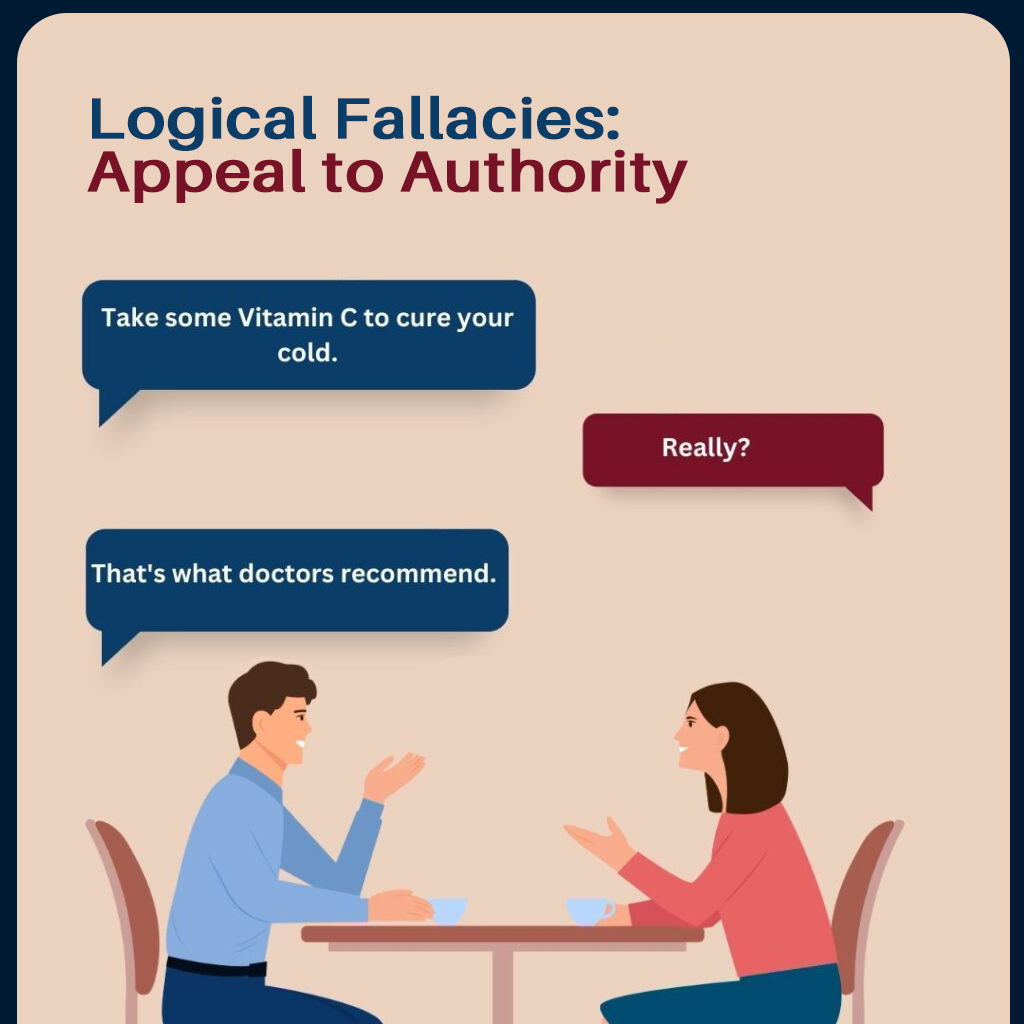Your cart is currently empty!

The Appeal to Authority Fallacy Today
The Appeal to Authority logical fallacy has become a pervasive element, influencing public opinion and policy decisions with increasing frequency. This fallacy occurs when an argument relies on the opinion of an authority figure or institution instead of presenting direct evidence. While appealing to experts can be informative, the problem arises when their authority is used to dismiss or overshadow other valid perspectives and evidence. The COVID-19 pandemic has starkly highlighted the consequences of this fallacy, shaping the cultural zeitgeist in ways that merit critical examination.
Understanding the Appeal to Authority Fallacy
The Appeal to Authority fallacy can be understood as a shortcut in reasoning where the credibility of an authority is used as a substitute for evidence. This can manifest in two primary ways:
- Genuine Experts Misused: Here, even though the authority figure may possess legitimate expertise, their statements are taken as incontrovertible truth without proper scrutiny of the underlying evidence. This can lead to a lack of critical thinking and a blind trust in the expert’s opinion.
- False Authorities: In this case, individuals or entities lacking relevant expertise are presented as authorities. Their opinions are given undue weight, misleading the public and shaping opinions based on unqualified perspectives.
The Pandemic Response: A Case Study
During the COVID-19 pandemic, the reliance on authoritative figures and institutions was excruciatingly prominent. Governments, media outlets, and social media platforms frequently cited health authorities and experts to guide public behavior and policy. While expert guidance is crucial during a public health crisis, the manner in which these authorities were used often reflected the Appeal to Authority fallacy in crusial ways. Resulting in the promotion of certain experts and the suppression of others in an attempt to maintain a cohesive narrative.
Overreliance on Select Authorities
Throughout the pandemic, certain health authorities, such as the World Health Organization (WHO) and the Centers for Disease Control and Prevention (CDC), became central figures in the global response. Their recommendations were often treated as absolute, leaving little room for alternative scientific opinions or critical discourse. For instance, the evolving guidance on mask usage and social distancing highlighted how expert opinions could change with new data. However, initial adherence to these guidelines was often framed as beyond question, discouraging a nuanced understanding of the evolving situation.
Suppression of Dissenting Voices
The Appeal to Authority fallacy also played a role in marginalizing dissenting voices. Scientists and medical professionals who offered differing perspectives on treatment protocols, lockdown measures, and vaccine distribution were frequently dismissed or censored. The emphasis on a singular authoritative narrative limited the scope of scientific debate and stifled potential alternative solutions. This approach not only undermined the scientific method, which thrives on questioning and rigorous testing of hypotheses, but also eroded public trust in the scientific community when recommendations changed.
Media and Public Perception
Media outlets played the most significant role in perpetuating the Appeal to Authority fallacy. By presenting certain experts as infallible sources, they contributed to a polarized public discourse. The tendency to frame scientific debates as settled facts led to a binary view of the pandemic response, where questioning the prevailing narrative was seen as anti-scientific or conspiratorial. This False Dichotomy created social divisions, with individuals either aligning strictly with authoritative guidance or rejecting it entirely, often based on perceived credibility rather than evidence.
Impact on Policy and Society
The impact of the Appeal to Authority fallacy during the pandemic extends beyond public opinion to tangible policy decisions. Governments implemented sweeping measures based on the advice of health authorities, sometimes without sufficient consideration of economic, social, and psychological repercussions. The prioritization of authoritative recommendations over a balanced, interdisciplinary approach contributed to significant societal disruptions. While the intention was to protect public health, the lack of critical evaluation and adaptability in policy-making often led to unintended consequences, such as increased mental health issues and economic disparities.
Moving Forward
The pervasive use of the Appeal to Authority fallacy during the pandemic has had a profound effect on the cultural zeitgeist, highlighting the need for a resurgence in critical thinking and skepticism. In an era where information is abundant and easily accessible, the ability to discern credible evidence from authoritative assertions is crucial. To navigate the complexities of modern discourse, it is essential to foster a culture of critical awareness. This involves:
- Questioning authoritative claims,
- Seeking multiple sources of information, and
- Understanding that expertise does not equate to infallibility.
By promoting critical thinking skills, individuals can better evaluate the validity of information and make informed decisions. While expert opinions are invaluable, they should be weighed alongside empirical evidence and alternative viewpoints. Encouraging open scientific debate and considering interdisciplinary perspectives can lead to more robust and effective solutions. This balanced approach can help mitigate the polarizing effects of the Appeal to Authority fallacy and promote a more inclusive and adaptive response to crises.

Leave a Reply